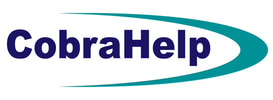Employers Who Must Comply with COBRA Law
COBRA generally applies to all private-sector group health plans maintained by employers that have at least 20
employees on more than 50 percent of its typical business days in the previous calendar year. Both full- and part-time
employees are counted to determine whether a plan is subject to COBRA. Each part-time employee counts as a fraction
of a full-time employee, with the fraction equal to the number of hours that the part-time employee worked divided by the
hours an employee must work to be considered full time.
COBRA also applies to plans sponsored by state and local governments.1 The law does not apply, however, to plans
sponsored by the Federal Government or by churches and certain church-related organizations.
What is a group health plan? It is any arrangement that an employer establishes or maintains to provide employees or their
families with medical care, whether it is provided through insurance, by a health maintenance organization, out of the
employer’s assets, or through any other means. “Medical care” includes for this purpose:
Life insurance is not considered “medical care,” nor are disability benefits**. COBRA does not cover plans that provide only life insurance or disability benefits.
Group health plans covered by COBRA that are sponsored by private-sector employers are generally welfare plans under ERISA and therefore subject to ERISA’s other requirements. Under ERISA, group health plans must be administered by a plan administrator, who is usually named in the plan documents. Many group health plans are administered by the employer that sponsors the plan, but group health plans are also frequently administered, in whole or in part, by another individual or organization separate from the employer, such as a professional benefits administration firm. Carrying out the requirements of COBRA is the direct responsibility of the plan administrator.
*While LIFE insurance benefits are not typically subject to Federal COBRA, there is currently an exception for the State of Minnesota. Minnesota employers who are required to comply with COBRA must offer Life insurance as part of continuation coverage to employees who had the life benefit at the time of a qualifying event.
employees on more than 50 percent of its typical business days in the previous calendar year. Both full- and part-time
employees are counted to determine whether a plan is subject to COBRA. Each part-time employee counts as a fraction
of a full-time employee, with the fraction equal to the number of hours that the part-time employee worked divided by the
hours an employee must work to be considered full time.
COBRA also applies to plans sponsored by state and local governments.1 The law does not apply, however, to plans
sponsored by the Federal Government or by churches and certain church-related organizations.
What is a group health plan? It is any arrangement that an employer establishes or maintains to provide employees or their
families with medical care, whether it is provided through insurance, by a health maintenance organization, out of the
employer’s assets, or through any other means. “Medical care” includes for this purpose:
- Inpatient and outpatient hospital care;
- Physician care;
- Surgery and other major medical benefits;
- Prescription drugs; and
- Dental and vision care.
Life insurance is not considered “medical care,” nor are disability benefits**. COBRA does not cover plans that provide only life insurance or disability benefits.
Group health plans covered by COBRA that are sponsored by private-sector employers are generally welfare plans under ERISA and therefore subject to ERISA’s other requirements. Under ERISA, group health plans must be administered by a plan administrator, who is usually named in the plan documents. Many group health plans are administered by the employer that sponsors the plan, but group health plans are also frequently administered, in whole or in part, by another individual or organization separate from the employer, such as a professional benefits administration firm. Carrying out the requirements of COBRA is the direct responsibility of the plan administrator.
*While LIFE insurance benefits are not typically subject to Federal COBRA, there is currently an exception for the State of Minnesota. Minnesota employers who are required to comply with COBRA must offer Life insurance as part of continuation coverage to employees who had the life benefit at the time of a qualifying event.




